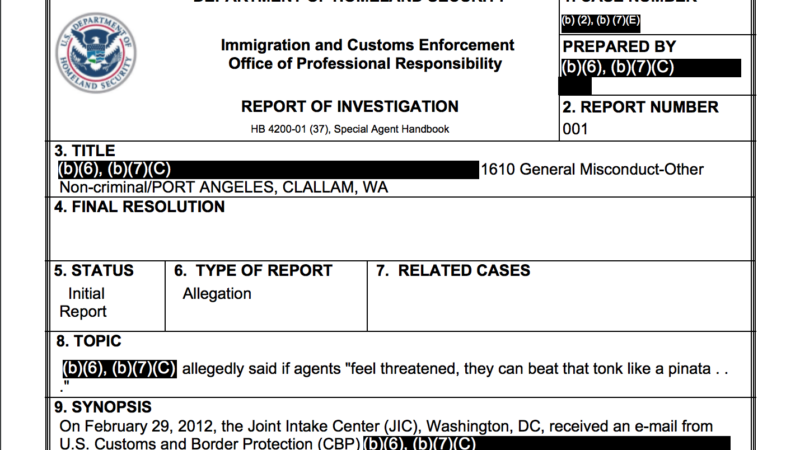CBP Official Allegedly Said Agents Should 'Beat That Tonk Like a Piñata Until Candy Comes Out'
The 2012 internal affairs report complaint was filed by a use-of-force instructor who warned the advice could lead to lawsuits.

Among the criticisms of the deployment of Customs and Border Protection (CBP) officers to Portland is that CBP is one of the more problem-ridden federal law enforcement agencies.
CBP, the nation's largest civilian law enforcement agency with roughly 60,000 employees, has higher termination rates than other federal law enforcement agencies, lower recruiting standards, longstanding corruption problems, and a well-documented toxic culture.
Here's another small but notable data point:
A CBP official was referred to internal affairs investigators for allegedly telling a room full of supervisors in 2012 that if Border Patrol agents feel threatened by a migrant, they should "beat that tonk like a piñata until candy comes out."
A CBP use-of-force instructor emailed the Immigration and Customs Enforcement Office of Professional Responsibility (OPR), which handles internal affairs for CBP, on Feb. 29, 2012, to report the potential misconduct. The complaint generated an OPR investigation report, recently obtained by Reason through a Freedom of Information Act (FOIA) request.
The instructor wrote that at a supervisors meeting the official, whose name was redacted, said during a discussion on assaults against Border Patrol agents, "you tell all the guys that if they feel threatened, they can beat that tonk like a piñata until candy comes out."
"Tonk" (sometimes spelled "tonc") is a slang CBP term for a migrant. It allegedly refers to the sound of hitting someone on the head with a flashlight, although some Border Patrol defenders claim it is an acronym for "Territory of Origin Not Known."
Last year, federal court records showed that a Border Patrol agent in Nogales, Texas, accused of hitting a Guatemalan migrant with his truck frequently used the word "tonk," among other descriptors like "mindless murdering savages" and "disgusting subhuman shit unworthy of being kindling for a fire." The agent, Matthew Bowen, was sentenced to probation for deprivation of rights under color of law.
Rolling Stone, in a story about the case against Bowen, described the history of the term:
A federal court case from 2004, which also centered on accusations of excessive force by the Border Patrol, includes an agent's definition of "tonk" as "the sound heard when a 'wetback' is hit over the head with a flashlight." Josiah Heyman is the chair of the anthropology department at the University of Texas, El Paso. In research on the border, he's heard Border Patrol agents use the term "tonk" since the early 1990s. "That's their position in the hierarchy," he says of undocumented migrants in relation to Border Patrol agents. "They're hittable people."
The word also popped up in a secret Border Patrol Facebook group, unearthed by ProPublica, that was full of jokes about migrant deaths and vulgar, sexual memes about Rep. Alexandria Ocasio-Cortez (D–N.Y.). CBP announced earlier this month that four Border Patrol agents had been fired over their posts on the Facebook group.
A CBP spokesperson told Mother Jones last year that, "there is no clear answer on where the term originated or if it was once considered an acronym, but flatly, it is now considered a derogatory term and CBP does not condone its use."
But the complaint against the CBP official wasn't concerned with the word so much as his encouraging illegal and excessive force against migrants.
"I, being a use of force instructor, told him that I didn't believe that that was within the use of force policy, and I cited the use of force continuum in an attempt to clarify the issue," the instructor's email to OPR said. "I told him that there are indicators that can help determine if someone will become assaultive, like the thousand yard stare, but that in itself does not meet the criteria for aggressive assaultive behavior. He told me that it did and, within the confines of the supervisor meeting taking place, I relented to keep the meeting moving."
"I believe that his statement undermines the use of force policy," the instructor continued, "and could lead our agents into possible litigation if it is his wish that we preach this philosophy to the agents."
Reason filed the FOIA request to see if any CBP internal investigations had ever mentioned the term. (Silly me, I requested internal affairs records between 2012 and 2019, but CBP didn't even have an internal affairs department until 2014—11 years after it was established.)
The OPR report does not say how the case was resolved, or whether the CBP official was disciplined. CBP's public affairs office did not immediately respond to a request for comment.


Show Comments (101)